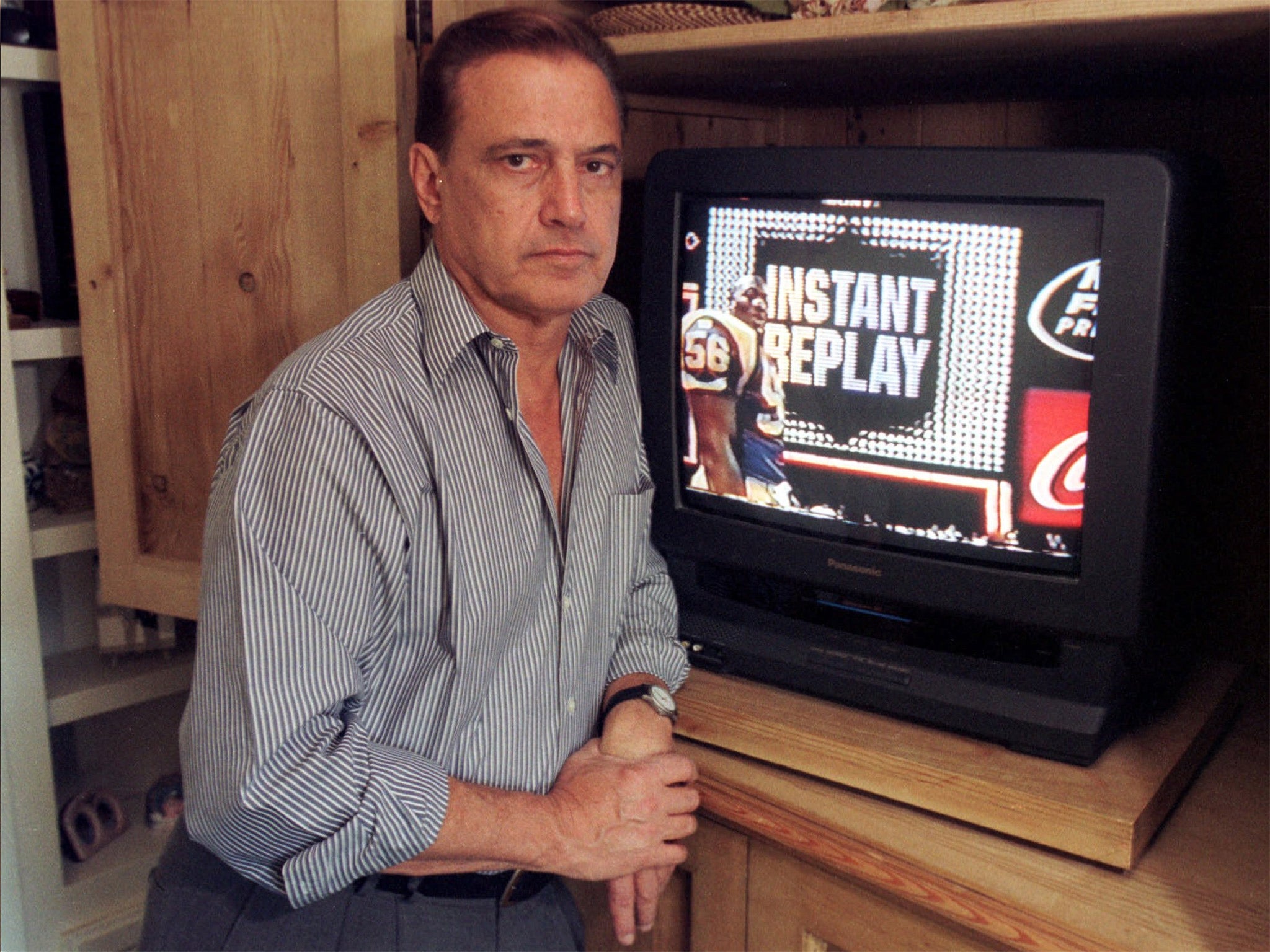Tony Verna: Television producer who invented the instant replay
Verna's 1963 invention changed the way sport is viewed and refereed

Before Tony Verna invented instant replay no one said, "Let's go to the videotape." Verna was directing the Army-Navy football game for CBS Sports in 1963 when he ran the first instant replay on television, changing the way sports were viewed – and, over time, refereed. His invention, for which he received no patent or payment, was one of the most significant in sports and entertainment history.
Verna, who began working in television at the age of 19, had helped direct the 1960 Olympic Games in Rome and was one of the leading sports producers at CBS when he came up with the idea for instant replay. He quietly arranged for a videotape machine, then the size of a refrigerator, to be transported from New York to Philadelphia, where the annual football game between Army and Navy would be played.
Delayed a week because of the assassination of President John F Kennedy, the game took place on 7 December 1963, at Philadelphia's Municipal Stadium before 100,000 spectators. A solemn ceremony commemorated the murdered president, who had been a Navy veteran and had attended the two previous games between the academies.
After the kick-off Verna kept one camera on the quarterback. Several times during the game he wanted to show a replay, but technical glitches got in the way. Among other things, the roll of videotape in the machine contained an old episode of I Love Lucy, and when Verna wanted to see a move on the pitch, a fleeting image of Lucille Ball would flicker across his monitor.
With Navy leading 21-7 in the fourth quarter, everything finally came together. The Army quarterback Rollie Stichweh faked a pass to his halfback then ran for a one-yard touchdown. Seconds later, Verna knew that the moment had been captured on videotape. When the replay of the touchdown was shown, the commentator Lindsey Nelson shouted "This is not live! Ladies and gentlemen, Army did not score again!"
It was a memorable game in Army and Navy's long football rivalry, but it soon became better known for the sensation created by Verna's invention. When the technology was used again in the Cotton Bowl on 1 January 1964, sportcaster Pat Summerall gave it the name that would endure: instant replay.
Within a year it became standard in the US for virtually every kind of sports programming. In Britain, Match of the Day began in August 1964, and instant replay was soon in use (although British viewers would have to wait until 1971 for slow-motion replays). It was credited with helping make gridiron the most popular televised sport in the US, with almost every play re-examined from countless angles. "We changed the way people watch sports on television," Verna said in 2003. "You can't imagine sports without it."
By the 1990s, instant replay was being used to review calls by officials in American football, basketball, hockey and other sports, and today is a mainstay of top-level rugby, in which a huge proportion of decisions are referred to the TV official. Sports Illustrated called instant replay one of the 20 most significant "tipping points" in sports in the second half of the 20th century.
Verna continued to work behind the camera. He directed 12 Kentucky Derby broadcasts and one of professional American football's most celebrated games, the 1967 "Ice Bowl", in which the Green Bay Packers beat the Dallas Cowboys for the NFL championship in sub-zero weather. But for years he was all but forgotten as the developer of one of the most important innovations in sports and broadcasting history. "What bothered me is that [CBS] never gave me the recognition," he said in 2008. "This wasn't a mushroom that came out of the ground. Someone had to come up with it."
He was born in 1933 in Philadelphia. His father, an Italian immigrant, was a photographer. Verna left the University of Pennsylvania to take his first job in television in Philadelphia, and by 1955 was directing baseball broadcasts. Before leaving CBS in 1981 he directed or produced virtually every kind of sporting event, including tennis, figure skating, hockey and basketball.
Verna, who died of leukaemia, later produced interviews with Mother Teresa and presidents Ronald Reagan and George HW Bush. He was the co-producer and co-director of the US end of Live Aid and directed worldwide coverage of Pope John Paul II's prayer for world peace. He wrote several textbooks about television production plus a novel and a memoir. In recent years he developed several applications for smartphones. "I didn't invent instant replay to improve officiating, or anything like that," he said in 2013. "I invented it for a better telecast."
MATT SCHUDEL
Anthony Frederick Verna, television producer: born Philadelphia 26 November 1933; married firstly Joanna Hayes (marriage dissolved; one daughter), secondly Carol Hahn (one daughter, one son); died Palm Desert, California 18 January 2015.
© The Washington Post
Join our commenting forum
Join thought-provoking conversations, follow other Independent readers and see their replies
Comments
Bookmark popover
Removed from bookmarks